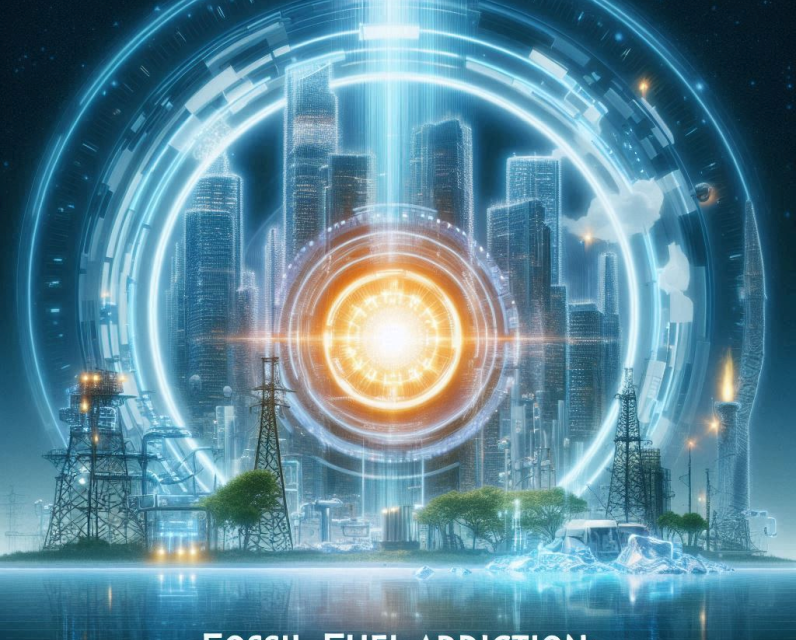Unpublished Opinions
Clinton is an accredited writer for numerous publications in Canada and a panelist for talk radio across Canada and the United States
FOSSIL FUEL ADDICTION: Zero Point Energy - Are We Evolved Enough?

Imagine a physicist, after countless late nights poring over complex equations, suddenly stumbles upon the key to harnessing Zero Point Energy
Yoko Ono once said, "People of earth, how are you?"
Imagine a physicist, after countless late nights poring over complex equations, suddenly stumbles upon the key to harnessing Zero Point Energy. A clean, emissionless power source, available to all. In that moment of profound discovery, the question that might echo in their mind – or perhaps in yours, dear reader – is this: are we truly ready to walk away from fossil fuels as our primary source for heating, manufacturing, and transportation? This is not a technical question. It is a human one. Because even if physics eventually allows it, the harder part is whether we, as a global civilization, can navigate the social, economic, and ethical transformation that would follow - a transformation that could either uplift humanity or deepen our divisions, depending on the choices we make.
The possibility of manipulating gravitational and inertial forces, or accessing energy from the quantum vacuum, demands deep ethical reflection. Such technologies - if they exist - would represent a turning point in human history. They could carry transformative potential across energy, transportation, space travel, and medicine, but also pose existential risks through misuse, unequal access, and destabilizing global power dynamics. Imagine a world where energy scarcity vanishes overnight - would we share this abundance equitably, or would the same impulses that hoard wealth and power today turn this gift into a new battlefield?
Can Zero Point Energy be allowed to exist in a world of capitalism? History suggests transformative technologies - like nuclear power or the internet - are often weaponized or monopolized before they serve the common good. Zero Point Energy is not intended to be appropriated for militarization, secrecy, or corporate monopolization. Gravity and vacuum field engineering - unlike traditional technologies - would directly interface with the underlying structure of society. That capability could be used to uplift entire societies, or to concentrate control in the hands of a few. Without deliberate guardrails, such as transparent, international oversight, the risk of profiteering or authoritarian control looms large.
Importantly, any transition away from fossil fuel-based energy must acknowledge and support the communities whose livelihoods, economies, and identities are currently intertwined with those industries. A sudden technological shift - however ecologically necessary - can result in economic collapse, social dislocation, and psychological distress in regions built around coal, oil, and gas. In Newfoundland and Labrador, offshore oil production underpins much of the provincial economy and employment base. In Alberta, the oil sands represent not only a major industry but a deeply embedded political and cultural identity. In the United States, coal towns throughout Appalachia have already experienced generations of hardship from industrial decline, automation, and globalization. To repeat such transitions without foresight would be a grave ethical failure. We cannot solve one crisis - climate change - by creating another for workers and families whose dignity and stability are tied to these industries.
Governments, too, are deeply dependent on fossil fuels - not only for energy security, but for tax revenue, trade surpluses, and sovereign wealth. Provinces like Alberta fund major portions of their public services - including health care, education, and infrastructure - through royalties and taxes generated by oil and gas. Many national governments rely on fossil exports to maintain fiscal stability and geopolitical leverage. A rapid shift in the global energy paradigm could leave these states financially destabilized, undermining their ability to serve their populations or maintain democratic legitimacy. Norway’s sovereign wealth fund offers a model for reinvesting fossil wealth into future stability, but not every nation has that luxury or foresight. Ethical innovation must include economic frameworks that allow nations to adapt without sacrificing civil cohesion or public well-being.
The deployment of next-generation energy systems must be accompanied by just transition strategies: large-scale retraining and education programs, public investment in infrastructure and innovation, economic diversification, and long-term social safety nets. These aren’t mere policies - they’re moral imperatives to ensure no one is erased in the rush to a new era. Innovation must not come at the cost of uprooting entire ways of life without offering viable, inclusive alternatives.
These outcomes are not determined by the physics - they are shaped by human choices. And if we are honest, those choices are too often guided by inertia, short-term gain, and comfort in the familiar. I include myself in this. As researchers, engineers, citizens, and caretakers of this planet, we have not always been bold enough, caring enough, or curious enough about the real consequences of what we create - or fail to create. Yet we’re capable of more. The question is whether we’ll summon the courage to prioritize collective well-being over entrenched power or fleeting profit. The question is not whether we can build new tools, but whether we are ready to wield them wisely.
It is critical that any technologies arising from this or similar frameworks are developed transparently, under international oversight, and guided by core principles: inclusivity, accountability, and a commitment to shared prosperity. As we stand at the edge of a possible impending new era in physics, we must remember that science is not neutral. It reflects our values, our governance, and our collective vision. The future we shape will be the one we earn - together.
Are we truly ready for a world of abundance and equitable access, or are our current systems too deeply entrenched?



Comments
Be the first to comment